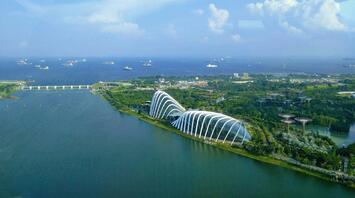Singapore Races to Contain Oil Spill Affecting Luxury Beach Resort

Singapore is urgently addressing an oil spill that has impacted a luxury beach resort, a marine reserve, and other areas. The spill occurred after a collision between a Netherlands-flagged dredger, Vox Maxima, and a Singapore-flagged bunker vessel, Marine Honor, on Friday, according to the Maritime and Port Authority of Singapore (MPA).
Despite initial containment and treatment with dispersants, tidal currents spread the oil beyond the busy Pasir Panjang Terminal cargo port to Sentosa, a popular resort island featuring luxury hotels and Universal Studios Singapore. The incident coincided with the Hari Raya Haji holiday weekend, increasing the potential for local and tourist exposure.
The environmental impact is significant. Local conservation group Marine Stewards reported oil-soaked birds, otters, monitor lizards, and dead marine life, including fish and a sea snake. Photos of affected wildlife and shorelines have been shared on social media.
Cleanup efforts intensified on Monday, with around 100 workers deployed across Sentosa’s beaches. While Sentosa remains open, swimming and water activities are banned at Tanjong, Palawan, and Siloso beaches on the island's west coast. Authorities closed the outlying islands of St. John’s, Lazarus, and Kusu on Sunday evening as the slick reached these popular day-trip destinations.
To combat the spill, authorities deployed skimmer vessels and laid 1,500 meters of oil absorbent booms to protect a coastal natural reserve lined with mangroves. The National Parks Board, along with scientists and volunteers from Friends of Marine Park, are actively involved in the efforts.
Singapore, a major global shipping and fuel bunkering hub, lies along a crucial strait connecting the Indian Ocean and the South China Sea. This narrow, busy waterway, measuring 13 kilometers long and 19 kilometers wide, sees approximately 1,000 ships passing daily.
Greenpeace regional campaign strategist Heng Kiah Chun emphasized the incident as a "wake-up call" to phase out fossil fuels, which cause lasting environmental damage. The spill highlights the vulnerability of the region’s vital and biodiverse marine protected areas and fisheries.



















